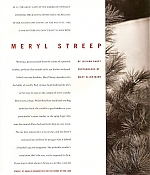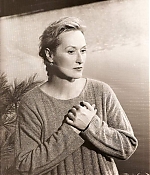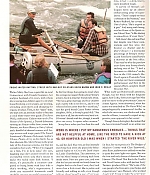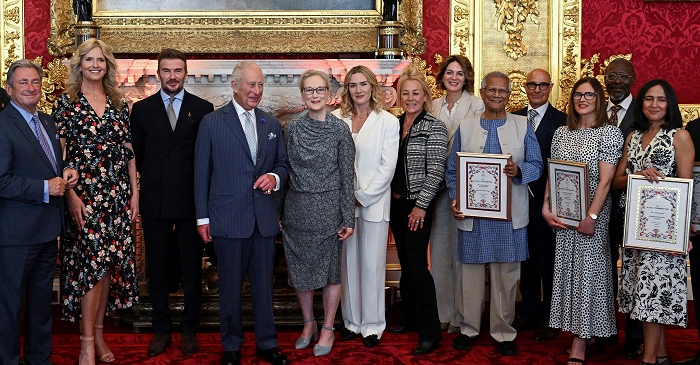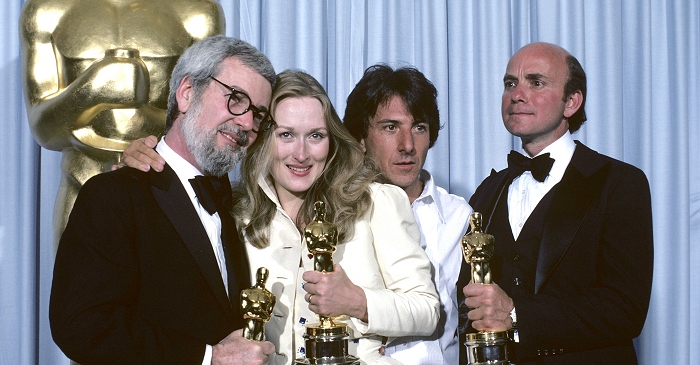|
Simply Streep is your premiere online resource on Meryl Streep's work on film, television and in the theatre - a career that has won her acclaim to be one of the world's greatest living actresses. Created in 1999, Simply Streep has built an extensive collection over the past 25 years to discover Miss Streep's body of work through thousands of photographs, articles and video clips. Enjoy your stay and check back soon.
|
|
The US Interview: Meryl Streep
US Weekly ·
October 1994
· Written by Juliann Garey
|
|
Tags
|
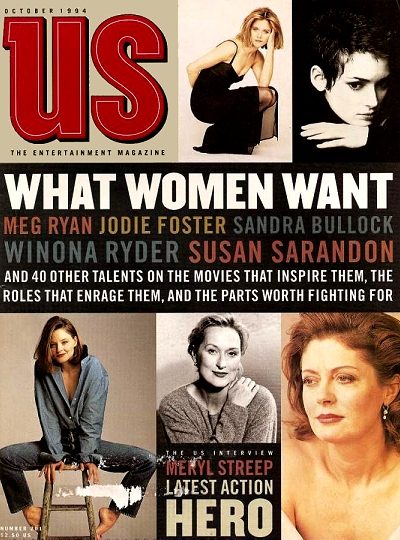
Wearing a gauzy peasant dress the colors of a peacock feather, perfectly flat sandals and a tan leather backpack hefted over one shoulder, Meryl Streep meanders into the lobby of a stuffy Park Avenue hotel looking like she’s on her way to class on the campus of some crunchy liberal-arts college. With blond hair trendlessly trailing down her back, she could be a grad student or your preschooler’s music teacher or the aging hippy who runs the natural-fibers bed-and-bath shop in your town. No one here notices she’s a movie star, and she doesn’t announce her celebrity by trying to hide it behind a baseball cap and sunglasses. She probably wouldn’t even know that’s the way you’re supposed to do it. If you stop to think about it, Streep is a lot like a real-life Walter Mitty. She lives a quiet life in rural Connecticut with Donald Gummer, her sculptor husband of 16 years, with whom she is rearing four children aged 3 to 14 while housebreaking a new puppy, car-pooling, attending swim meets and shopping for organic produce. Then, in her “spare” time, she steps into an alternate reality to become a crack white-water-river guide (The River Wild), a telekinetic Chilean matriarch (The House of the Spirits), a Danish debutante running an African coffee farm (writer Isak Dinesen, née Karen Blixen, in Out of Africa) and a handful of ethereal women with foreign accents and tragic pasts (The French Lieutenant’s Woman, Holocaust, Sophie’s Choice, Plenty, A Cry in the Dark). So, in that alternate life, Meryl Streep is the great lady of the American cinema, not that she considers that work. “When I’m engaged on a film, I’m in la-la land,” she says, laughing once she’s seated herself on the overstuffed velvet sofa that’s meant to make this faded suite look homey. “I mean, it’s practically a vacation compared to being home with four kids -that’s working, that’s organization. I think any successful housewife could probably run any successful corporation.”
Practicality and organization may not be the first things that spring to mind when the average moviegoer thinks about Streep’s artistry, but it is what her friends talk about. “She has a great marriage and four children and a nanny who is not live-in, and it’s not reflected in her career that she’s sacrificed,” says her good friend Carrie Fisher (whose daughter, Billie, is Streep’s godchild). “She does have it all, but she works very hard at it. If I weren’t friends with her, though, it would drive me crazy. It upsets other women.” Streep has a softer jaw line than she used to, and her dark blue eyes are less intensely searching than when she played the beleaguered Sophie or A Cry in the Dark’s frantic Lindy Chamberlain. This afternoon, no one but Meryl Streep is looking back from inside there. Hers are quiet eyes, and now that she has just moved her family from Los Angeles back to the East Coast, they look more than a little tired. She is polite and friendly and willing to talk, even though talking about herself is one of her least-favorite things. And she laughs a lot more than you might think – all the time, in fact – a deep, hearty, open-mouthed laugh.
A survey of Streep’s colleagues turns up an almost embarrassing array of superlatives. “There’s simply no finer craftsman in the business,” says Robert Redford, her co-star in Out of Africa. “She’s as good as it gets.” And acting with Streep, says her House of the Spirits costar Glenn Close, “is like skating on smooth ice. It’s just there.” Still, there’s the awkward fact that despite nine Oscar nominations and two wins (for Kramer vs. Kramer and Sophie’s Choice) – a worrisome percentage of Streep’s exotic-accent films have raised hardly a murmur at the box office. That may be why the past few years have seen Streep slowly inching out of her “I had a farrumm in Ahhfrica” niche; first in the 1989 comedy She-Devil, again in Postcards From the Edge (an Oscar-nominated performance) and then in the special-effects campfest Death Becomes Her.
What really got Hollywood’s attention, though, was her break with her longtime agent, Sam Cohn, three years ago last May and her move to the powerhouse Creative Artists Agency. Soon afterward, when her name was attached to The River Wild, an unapologetic ally commercial thriller in which she out-rows, out-thinks and takes out the villains, it seemed to signal an aggressive, new approach to her career. Though Streep downplays the notion that she has reinvented herself as an action star (in fact, her next project is The Bridges of Madison County with Clint Eastwood), after River, audiences are unlikely to see her in quite the same light ever again. She was the first and only choice of director Curtis Hanson (The Hand That Rocks the Cradle) and David Foster, who, with partner Larry Turman, produced River. “She’s one of the rare people who lives up to your hopes and expectations,” says Hanson, who worked closely with Streep to make the script more of a complex psychological thriller. “She became my complete partner in terms of what my concerns were. We found solutions together. As I’m editing the movie, every day I’m watching it thinking how different it would be without Meryl.’ She doesn’t move from the faded sofa much during the next few hours. She gestures a lot with her hands and her head, but she gets up only a couple of times. And when she does, it’s sudden. She springs up and skips sideways over to the china coffee service to pour herself another cup. She looks like Alice in Wonderland, and it’s clear this is her party.
People see ‘The River Wild’ as a real departure for you. Were you looking for something different?
I definitely don’t go looking for anything. You know, I’m really happy to stay on the couch. [Laughs] But I thought two things about it: I thought, My god, why don’t they want somebody 33 instead of me? And then I started to think about the possibility of being outdoors for four months in Montana. I’ve never been to the West, except for Los Angeles, which doesn’t count. So I began to look at it as an adventure that I could take my children on – and a physical challenge [laughs]. My daughter fractured her foot yesterday. She just sort of leapt before she looked – and that’s how I went into this film, like a 10-year-old. And now I respect the size of that place and how you cast your fate to the current. That’s why most of the people who do what I did for this movie are in their 20s or early 30s, or they don’t have four children.
What was the most difficult challenge?
There are two different physical challenges in the film. One is of nerve and strength. And the other is a form of stillness and finesse sculling – it’s a beautiful art. You can’t just pick it up and do it. So I had to do a lot more preparation than I normally do for a film.
How did you train?
Well, what I mostly didn’t have were the rhomboid muscles – the ones that go up your spine.
Those Madonna muscles?
Yeah [laughs], the Madonna muscles. So I had to lift weights and do all that. But the sculling is a very different sort of task.
I heard that you rowed with a boy’s rowing team to train.
Well, no, I didn’t row with a boy’s rowing team. I, you know, have four kids. The only time that I’m allowed to pursue my own private work is between five and seven in the morning. So I would go at 5 a.m. with my coach, who was the assistant coach of the junior-varsity rowing team at the local boys’ prep school near where we live. And we’d go out, and I’d row across this lake until I fell in, and he’d fish me out [laughs], and I’d get back in.
What else did you do to prepare physically, and by the way, has any of it stuck?
Working out was the only thing I did when I was preparing. No one can work out like that all the time – Demi Moore, maybe. I worked out three and a half hours every day, and I ate 900 calories and practically no cooked food. Oh god, it was ridiculous.
Sounds pretty horrible.
I know. For, like, six months. And what really amazed me was that I didn’t look that different! [Laughs] I did strength training for an hour and a half to two hours and then yoga for an hour, which I still do. I love it -not to sound like I’ve been in California too long, but it really is very centering. I have almost no time alone – not even in the bathroom, because Louisa is, at three, deciding that maybe, yes, she’ll be toilet trained. So she wants to come in and share [laughs].
For a thriller, ‘The River Wild’ isn’t that violent. Is that why you were upset that the promotional trailer showed you wielding a gun?
It really made me mad. I’m always mad, you know, when they say they’re going to do one thing and they don’t really mean it. They’re just saying it to mollify the woman. And so they said: “Oh, it’s only two weeks. And we really can’t find any other close-up that’s as powerful in the whole movie.” And so I – I objected to this being my Christmas gift to America, because they were just gonna run it for two weeks in the theaters at Christmas. Then they got such great response from the whole trailer that they decided to run it forever.
How did you decide to draw the line at what you would and wouldn’t do for this movie?
That was an everyday kind of fight with me and Curtis [Hanson], where our foreheads locked. And I thought sometimes Curtis would look through his viewfinder and not realize it was really people he was watching. And I’d have to come up and shake him with my wet hands and say: “That was me that just did that. That’s not a movie you’re watching. That’s real people! ” You know? And he’d ask us to do it again.
Is this the most physically demanding role you’ve had?
Oh yeah, or will have. There’s this one scene where I’m rowing at the foot of a pretty big waterfall in profile. I call it the Iwo Jima shot. And we did it over and over again because they were in love with this shot. So we did it all morning, and then in the afternoon, for dessert, we came back to do it again. But on the third time, I came down through the hole in the rapids, and the raft was thrown back. All of a sudden I was pulled back like there was a hook on my throat, and – free as a bird – I just went sailing out of the raft and under the bottom of it. And I don’t remember it at all. All I remember is coming out of the water about 500 yards down the river. But Curtis remembers it! Oh, he got it on film, definitely. And he had the nerve to ask me to do it again.
What is the strangest place you have ever performed in?
[Long pause] One of the most frustrating places I ever performed was in a ski lodge in Sugarbush Mountain. We did a Chekhov play at six at night. People shuffled in with their ski boots still on. Clomp! Clomp! Clomp!
And why were you doing this at a ski lodge?
And it was worse, because actually I wasn’t performing. I had directed this little play. I was so mad. I thought it was so disrespectful to my actors. It was my first job out of college. I worked in a summer theater that had made enough money that they were gonna try to run through the winter up in Vermont. They played at ski lodges.
Is it true that you once did a musical in a swimming pool?
Oh yeah, that’s right – at the Yale pool. It was The Frogs by Burt Shevelove and Stephen Sondheim, and I still remember the chorus for that. [Singing] “Rat-a-tat-tat” over and over again. “Rat-atat-tat, rat-a-tat-tat, rat-a-tat-tat.” I really doubt you’ll see any revivals.
One of your early water roles…
Yeah, right. God, I’d completely forgotten about that. Well, we got to rehearse with all these gorgeous boys running around, you know, in bathing attire. That was a large part of it. That pulled us in.
I understand acting wasn’t your first career goal. Why did you decide not to become an opera singer?
Well, I decided because I… [long sigh, pause}. No, I didn’t like opera.
Oh, well, that would tend to limit you.
And I really lost interest in practicing, and other things became more important. I became boy crazy. I was 15, 16. I’ve only recently, since I’ve been a grown-up, understood the allure of opera and its emotionality and passion.
What kind of music do you listen to now?
I listen to everything. My son and his friends, interestingly enough, like Counting Crows and Pearl Jam, that sort of thing. They also listen to the Beatles, Jimi Hendrix. I just really wanna call my father and say: “See? See!? It didn’t disappear in 10 years.” My son has great taste. I mean, he’s discerning about which cuts and everything. At 14 – I love seeing that. But there was a moment when he was very drawn to some of the worst of rap. You know, “Get down, bitch” kind of rap.
What did you do then?
You know what I did? There was a thing on the radio that had Flavor Flay [of Public Enemy] being interviewed by a black woman journalist. He, I guess, was arrested for beating up his wife. Or his girlfriend. The mother of his children. And his defense was, I can do whatever the f- I want. [Ed. note: In the interview, Flavor Flav implied that all women should expect to be beaten at one time or another.] And they rebroadcast these things in the afternoon. So when Henry came home from school, I said, “Listen to this.” And then I just left the room. So I came in afterward, and I said, “Whad’ya think about it?” He says, “Well, she must’ve done something to him.” You know, he responded the way he would’ve if one of his sisters had hit him on the head. But after a while he came to it on his own. There’s a point where you have to trust they will. He and his friends just dumped it in one summer.
Do you think you could be happy being a fulltime mother?
I really need the other outlet. For my psychological well-being. Such as that is.
In close succession, you worked on a very female set for ‘House of the Spirits’ and a very male set for ‘River.’ Any differences?
Both directors, Bille August and Curtis, have a highly developed female side, sensibility. Mike Nichols [Heartburn] had that thing, and Sydney Pollack [Out of Africa]. The best directors I’ve worked with are that way.
You mean, male directors?
Well, I’ve only worked with one female director. And that was Susan Seidelman [She-Devil]. It wasn’t a successful experience. She was eight months pregnant during the shoot and didn’t know it. So –
What?!
Oh, excuse me! She was not as in touch with her female side as maybe some of the men that I’ve worked with [laughs].
You don’t mean that literally?
Yes, I do. Literally eight months pregnant. And she said, “Well, I went to the doctor and…” Well, I think she thought she had a tumor – she thought she was dying. At any rate, she’d had a negative test – I’d say, “Go get another opinion.” They can sometimes be wrong. From experience. [Ed. note: Seidelman discovered she was six months pregnant after the shoot.]
‘River Wild’ producer David Foster told me there was one line you came up with – “I’m not on anybody’s side. I’m a mother” – that he thought was 100 percent you.
Yes, that was. “I’m not on anybody’s side. I’m on everybody’s side. I’m a mother.” Which is the truth.
So is this the role that’s closest to the real you?
Definitely. Sure. I mean, I’m not going to pretend that there is any great big fat characterization going on when I was doing a lot of this, because all I was thinking was, Keep everybody safe.
What kinds of roles have you turned down in the last couple of years?
Roles where the women are there to prop up the man or prop up the moral conscience of the movie – either women are in there as the conscience of the movie or as the c-t of the movie [laughs].
Have you been frustrated by what you’ve been offered?
I’ve always felt the actor’s classic response to a script I liked: I’m just grateful that they want me to do it. I can’t believe they do – and you take it right away so they don’t change their mind [laughs]. I’ve always found something that interested me, or I didn’t work, or I was pregnant.
Have you ever considered starting your own production company?
No, never. It’s not that I’m not interested, I’d love to have control over every aspect of everything I do, but – it’s impossible, given the life I’ve chosen, with all these kids and all the… you know, fractures.
Who is the strongest woman you know personally?
Well, I’m just drawn to very strong women. All my friends are frighteningly strong.
Frighteningly, for whom?
I’m having a reunion of six roommates from college at my house. They’re coming for three days, and they’re all appalled because they’re coming. [Laughs] But they’re coming from all over the place. And I’m really looking forward to it because I think after a certain point in your life you don’t make really close, to-the-end-of-the-world, trusting friends, and even though I rarely see them, I rely on them and those friendships as a sort of anchor. So all their faces just flashed before my eyes, all their haranguing opinions [laughs], clashing over the next few days, lubricated by my rum punch.
Sounds like a lot of fun.
It’s great. It’s great for me. It’s not so very great for Don.
No, probably not. He’s not leaving town for three days?
I think he’s going to go into the studio and put a bag over his head.
What were you like in college?
I’m in better shape, I’m sure, than I was then …. I was a lot less cautious than I am now. I think that’s a result of being famous – you get more cautious. I had this thing happen, you know? My cousin is getting married, and I love her, she wants me to come to the wedding. But I said no, because if you go to a wedding and you’re famous, the wedding becomes about you, not the bride. And it is the weirdest experience to be famous and in a family group, at a funeral or something. You can’t explain it. I don’t think she understands it.
Why did you decide to leave Los Angeles?
I was lonely there.
Really?
But we weren’t really there in a committed way. Because we always called Connecticut home and spent a good part of the year there. So I probably didn’t give it a chance. But I was lonely there. I had more friends here. I think part of it is that it’s [entertainment] industry centered – and friendships get all mixed up with that, and I felt very much in jail.
What about the earthquake?
The earthquake had a profound effect on us. My son was sleeping elsewhere. It’s one thing if your chicks are all under one roof. But I didn’t know where he was – I mean, I knew where he was, but I didn’t know what the situation was, and we couldn’t call. But I can tell you my Shirley MacLaine story.
Wait! Let me guess: She predicted it.
Yes, she did, and it was five years ago, when we first went to California. The first movie I made in California was Postcards From the Edge, and we were all sitting around at lunch, and she said, “Meryl, how do you like California?” And I said: “You know, I feel sort of guilty, but I love it. I love it, I don’t why. It has flowers all the time. I love it – the only thing is, I’m a little bit scared of the earthquakes,” and everybody laughed uproariously. And Shirley looked at me very seriously, and she said, “How long do you plan on being out here?” And I said, “I don’t know maybe two years at the most.” And she said, “Well, you’re all right, because there’s not going to be a major earthquake until the winter of 1994.”
And the day after this thing, I woke up in a sweat because I remembered that she said this, and I saw her at this event, and I ran up to her and said, “Shirley, do you remember that you said that?” She said: “Of course. But I moved, and you didn’t.” [Laughs] I said, “OK, when’s the next one?”
Yeah, when is it?
November, next year. I don’t know if I believe it, but it’s just a little weird.
Has anyone ever advised you that you should do more of this? I mean, more press?
Oh yes. It’s been suggested to me. I probably should, but it depends on what a person wants. My feeling about it is that I’m not sure I owe everybody my personal world and the world of my children. I don’t think that necessarily goes with the job. I signed up with the drama school to be in plays.
Don’t you like reading about other people?
I get nauseous.
Really?
Because I think: Oh god, oh god, oh god, why would they do this? Why?
In light of that, was it a difficult decision to allow your 10-year-old daughter, Mamie, to be in ‘The House of the Spirits’?
I can’t remember if I’ve copped to that yet [laughs].
Yeah, you have, because I read it somewhere.
Oh? Yeah, well [long pause], it wasn’t difficult, because she really wanted to do it. But that doesn’t have anything to do with it. I thought that she’d be wonderful. And it was a little bitty part. And honestly, the real reason that I did it was because I really wanted to do The House of the Spirits, but it was being shot in Europe. And I thought, This way I’ll get to be with her. And so she came with a tutor, and we gave her a stage name so nobody would know that it was her.
So, if she or any of your other kids decided they wanted to do this professionally, how would you react?
After graduate school [laughs], they can do whatever they want.
Are you as circumspect as people think you are?
I think that to the extent that I am that way, it’s a function of my self-consciousness after becoming “Meryl Streep.” And, you know, my mother says: “People would give their right arm to be those things. Relax, enjoy it.”
Do you wish you could?
Yeah. I mean, I’ve seen people that really enjoy it, get off on it. But ultimately, no matter how much they enjoy it, it is an isolating thing. So, boohoo, poor me, that’s my sob story…
Are you as careful in your personal life as you are in your work?
I don’t feel that way in my work. That’s where I put my dangerous energies – things that are not helpful at home [laughs].
Like what?
Well, like the need to have a kick at 43 or however old I was when I started River.
Do you have any guilty pleasures? Is there a Chippendale’s calendar under the Audubon?
I don’t know. I’m really glad that I never did drugs, I have to say. Because if I had- it’s like, I’m glad I never skied when I was 18, because I probably would never do anything but ski.
I got the chance to talk to Robert Redford about you a little bit. And in addition to saying that he’d love very much to be in a comedy with you, he said you are simply the best there is. I’m sure you hate hearing that. But people do say It. What’s your response?
Well – I don’t know [makes a gurgling sound in the back of her throat]. I don’t think there’s any way to – oh, look, I’m really very proud to be a source of inspiration for actors. Because I really relied on the people that I watched and looked up to. Geraldine Page when I saw her in the theater, you know, that was a primer to me. Maggie Smith, Colleen Dewhurst. So I’m glad if I give that to other people. The other things, though, whatever they put in quotes – it’s impossible. It just makes you wanna go hide in the woods.


Posted on June 13th, 2025
|
Posted on May 18th, 2025
|
Posted on March 16th, 2025
|
Posted on February 24th, 2025
|
Posted on February 17th, 2025
|



